Iron Drops: Does My Baby Need Iron Supplements?
- Which babies need iron drops and why more often than not you should be using food and not supplements to fix low iron intake problems
- What types of side effects babies experience with iron drops and what to be careful about when using these
- How to increase iron intake using both plant and animal foods that babies can safely eat
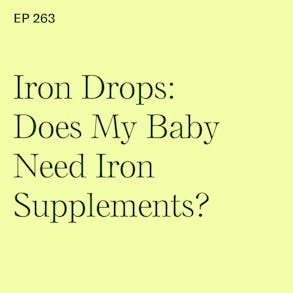
LISTEN TO THIS EPISODE
Episode Description
When should I give my baby iron drops…or are they a good idea at all? In this episode I’m walking you through the pros and cons of iron supplements, what the side effects are, why they can be dangerous for babies and children and how food can more often than not fix the iron intake problem so you don’t need supplements for your baby.
Links from this Episode
- Watch this YouTube video about “What to Do if Baby Has LOW Iron Levels?” from dietitian mom Katie
- Baby-Led Weaning with Katie Ferraro program with the 100 First Foods™ Daily Meal Plan, join here: https://babyledweaning.co/program
- Baby-Led Weaning for Beginners free online workshop with 100 First Foods™ list to all attendees, register here: https://babyledweaning.co/baby-led-weaning-for-beginners
Other episodes related to this topic:

Latest Episodes

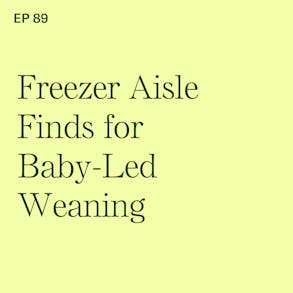
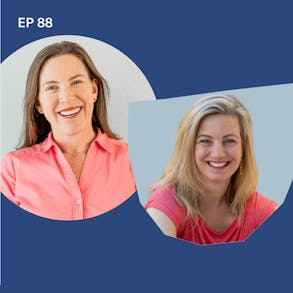
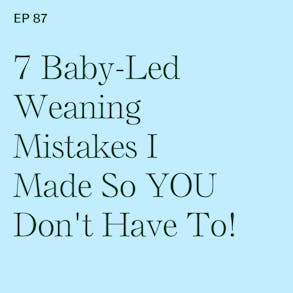
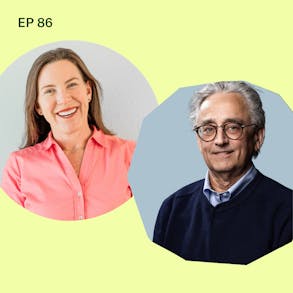
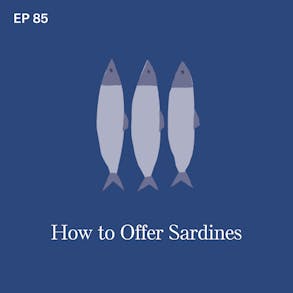
Katie Ferraro (1m 1s):
Yeah, for this baby consistently coming back with in-office hemoglobin levels under 11 and venous lab test confirms Iron deficiency. Sure. Iron Drops might be appropriate, but again, only if you're working with a pediatric dietitian. But if the low Iron levels are, as we see in most infants, a result of inadequate Iron intake, we need to be looking at a food fix. Okay. And focusing on the high Iron foods that babies can safely eat, not just putting a bandaid on the problem by immediately going to the Iron Drops. Hey there I'm Katie Ferraro, Registered dietitian, college nutrition professor and mom of seven specializing in Baby-Led Weaning. Here on the Baby-Led Weaning Made Easy podcast, I help you strip out all of the noise and nonsense about feeding, leaving you with the confidence and knowledge you need to give your baby a safe start to solid foods using Baby-Led Weaning.
Katie Ferraro (1m 54s):
Hey Guys, welcome back today. We're talking about Iron Drops, and does your baby need Iron Supplements? I know Iron is very top of mind for many of you making the transition from infant milk to solid foods with your babies. And as a Registered dietitian, specializing in Baby-Led Weaning I'm a food-first dietitian and always an advocate for helping your baby learn how to get nutrition from foods and not from Supplements. We talk a lot about this in the allergenic foods space, a lot of parents feeling pressure to buy all these expensive subscription model powders and Supplements for introducing allergenic foods. When, if we look at the data, we really see that all the protective benefits of introducing allergenic foods in the studies come from doing foods and not from Supplements.
Katie Ferraro (2m 38s):
And so we don't want parents to be offering Supplements unnecessarily to themselves or anyone in their family, including their infants. However, there are some instances when Iron Drops would be recommended or beneficial, but certainly not in all cases. So I'm gonna go through what are Iron Drops, who needs Iron Drops, some of the side effects of Iron Drops and some precautionary measures you'd want to take, a quick review of which foods have Iron and then some final thoughts about Iron Drops. All right. So let's start out. What are Iron Drops? These are supplemental forms of Iron, right? So supplemental means in addition to food. So food should always be our baby's primary source of nutrition with the exception of if your baby has a documented or underlying medical condition or a documented deficiency in vitamins or minerals.
Katie Ferraro (3m 30s):
When I say documented, I mean that you're working with a medical team that should include a pediatric Dietitian. We never self-diagnose or just start taking Supplements willy-nilly because we think our babies need them. Okay. So Iron Drops for infants can include either ferrous sulfate or ferrous fumarate or ferrous gluconate. Okay. And you don't really need to get too bogged down in the weeds with what type of Iron is in the Drops that your baby has just knowing that each of these vary in bio-availability. Okay. And that all forms of supplemental Iron can cause gastrointestinal issues. Okay. You might remember that when you were pregnant taking your prenatal vitamin, okay.
Katie Ferraro (4m 11s):
You might have not felt great because of morning sickness, but often times then the recommendation to take your prenatal on an empty stomach that really sets a lot of pregnant people off. And it oftentimes is the Iron in that prenatal that is so caustic to the GI system. So it's thought that up to 30 to 40% of people actually discontinue Iron Supplements because of the side effects. Okay. So babies of course can't tell us about their side effects, but we're gonna talk about how babies do tell us about their side effects. Even though they don't have language. So who needs Iron Drops? Okay. We start focusing on Iron, not stressing about it, but like moving it up in the list of priorities. As we get close to the six month mark, basically at the tail end of pregnancy, mom gives a big push of Iron to the baby and that lasts baby for about the first six months of life, of course in the first six months of life, 100% of baby's nutrition is coming from infant milk.
Katie Ferraro (5m 5s):
So be that breast milk or infant formula; infant formula is all fortified with Iron meaning it's been added back into it and breast milk while it's "lower in Iron than formula," the type of Iron that we find in breast milk is very well absorbed by the baby's body. So just know that you've got your bases covered up until about six months of age with the Iron that baby received from mom at the tail end of pregnancy. Now, of course, if baby was born premature, meaning they didn't get to that point of gestation where they would've got that push of Iron from mom, then there's the potential for Iron deficiency. But with premature babies, especially in the NICU, you're being very closely monitored for Iron status.
Katie Ferraro (5m 46s):
And if necessary being prescribed a recommended supplemental Iron in very, very micro doses, right? Iron is a micronutrient, although it is of vast importance to the body for blood health, for brain health, for cognitive development, for growth, all of these things, Iron plays a role in it's a micronutrient meaning that we need it in very, very, very small quantities. Okay? So the micronutrients, the vitamins and the minerals, we need them in either micrograms or milligrams, very, very small amounts. And you don't mess with this by giving mega doses. Okay. Unfortunately, Iron is still the most common cause of pediatric poisoning death reported to poison control centers across the United States.
Katie Ferraro (6m 27s):
The last thing you want is for a baby or a toddler, especially toddlers or older kids even, to get into Iron Supplements. Okay. And there's a big problem with marketing Supplements to children as "candy," okay. That, I was just reading some awful case studies back from the nineties in Los Angeles, about one toddler who died from ingesting thought up to be 30 to 40 prenatal vitamins. Okay. Obviously, even though the Iron is in very small quantities in milligrams or micrograms in these pills, if a baby or child eats a lot of them, of course they could could be poisoning so they could be dangerous and fatal even. And so that's an important concept because Iron is an over the counter product, right? You can go just down to your local drug store and pick up supplemental Iron.
Katie Ferraro (7m 8s):
And as a result, parents sometimes think, well, this is just like a little bit of insurance. I'll just add it on top to make sure baby's "getting enough. But we certainly do not want to be doing that. Okay. Because it can be potentially toxic and even fatal. So the babies who are at high risk for Iron deficiency, you know that because your course has been followed generally in many cases due to prematurity, okay, there are other underlying medical conditions that can lead to Iron deficiency or Iron deficiency anemia. But again, this is not something you should be fixing by yourself or going to the drugstore and just picking up and deciding to start on supplemental Iron. Okay. Now Iron deficiency is a real problem. It's thought that about 12% or so of infants age 6 to 11 months in the United States have inadequate Iron intake.
Katie Ferraro (7m 51s):
Okay. And 8% of toddlers have Iron deficiency. That doesn't mean run out and buy a bunch of Iron Drops. We want to solve the underlying problem, which is inadequate Iron intake. Okay. So if it's an intake issue, we fix it with food first and not with Supplements. So I have spoken and taught extensively about this. I know my own situation, my youngest daughter, our seventh baby, she's a set of boy, girl twins, the daughter, Hannah, she repeatedly had low Iron levels, borderline low, at her well checks towards the end of infancy. And so I've written extensively about this. One of the most trafficked articles on my website is an article I wrote called low Iron levels, baby boot camp.
Katie Ferraro (8m 31s):
And I share Hannah's whole course of in-office Iron testing, how her hemoglobin kept coming back below 11, what we did and why we chose to use food as a way to bring those Iron levels back up as opposed to Supplements. So it's a really long blog post with lots of pictures and lots of videos. But If you are not getting Iron screened in your pediatrician's office for your baby, that's an important article to read, cuz it talks about being an advocate because the American academy of pediatrics does recommend screening for Iron deficiency. Prior to 12 months of age, I don't wanna start solid foods at six months of age and be like offering all these foods, And then at 12 months of age, find out, oh my gosh, my baby's Iron level is low. Okay. I wanna know as I go, how the Iron levels are doing. So that article kind of teaches a little bit about that. But the general rule of thumb is that pediatricians like to see hemoglobin levels being at or above 11 grams per deciliter.
Katie Ferraro (9m 17s):
Okay. This is consistent with the world health organization, hemoglobin threshold. And so hopefully you are being tested in your child's pediatrician's office to know what the Iron levels are. Okay. And in the event that the Iron levels come back, the Iron levels come back low that is, why would you consider not doing Iron Drops? So I can share my own experience as a mom, but also my experiences as a dietitian specializing in infant feeding and that the side effects of Iron Drops are very well known. Okay. The number one being constipation. Okay. You probably remember being constipated during pregnancy. A lot of that has to do with the growing size of the fetus and the way it's pushing on your intestinal tract. But a lot of the constipation in pregnancy also has to do with prenatal vitamins. Okay. Iron Supplements can cause stomach pain.
Katie Ferraro (9m 57s):
They can cause diarrhea. They can cause nausea. In some cases they've been shown to cause teeth staining, although really like the biggest issue with the Iron Supplements is the GI distress. I know in my own infant daughter Hannah's situation, we were doing baby-Led Weaning doing a hundred first foods program. She was eating all sorts of high Iron foods, but I also knew that she was the type of baby who definitely favored the fruits and the vegetables and the carbs long before the meat. Okay. And while it's important to get a variety of nutrition from lots of different food groups, fruits, and vegetables, and most carbohydrate foods don't have Iron in them. Okay. So in that blog post, I was mentioning, I kind of shared our meal plan and how we reprioritized high Iron foods for her during this period she already had, was dealing with some constipation that is typical for the transition to solid foods.
Katie Ferraro (10m 40s):
The last thing I wanted to do with a baby who wasn't eating super great, certainly wasn't eating as well as her twin brother. So I had a, you know, a control there sitting right next to her was like scarfing everything up, including meats and his Iron levels were fine. She wasn't eating very much meat and her hemoglobin kept coming back below 11 and she was already a little constipated and she doesn't eat that much and really like love food as much as her brother. The last thing I wanna do is constipate her with Iron Drops and cause her intake to go even lower. So as a result, we decided to bypass the recommendation and had a very, you know, elevated conversation with my pediatrician about why we were deciding not to do the Iron Drops. And we did end up being able to get her Iron levels back up. But I do test her still regularly, even though she's toddler school age, she's now in preschool just to keep an eye on it because you guys are concerned about Iron now for your baby at six to 12 months of age.
Katie Ferraro (11m 26s):
But please know that Iron deficiency is still the number one, leading micronutrient deficiency worldwide for all children. It doesn't matter If you grow up in a rich country or a poor country, okay? Most children do not eat enough Iron from foods. And that's because most children eat highly refined white carbohydrate foods and maybe some fruit and maybe some milk, no Iron in white breads, no Iron in fruits, no Iron in milk. Okay. And we actually know that high intake levels of cows milk protein is associated with lower Iron levels. And that tends to be because these kids are filling up on cows milk. It's displacing other nutrient rich, including Iron rich foods that they otherwise could be eating, but they're not hungry cuz they're full of milk. So back to the babies, why might you skip Iron Drops?
Katie Ferraro (12m 8s):
It's generally because of constipation. In many cases it's not needed. Okay. It's kind of the bandaid we wanna solve the underlying problem, which is are the Iron levels low because intake level is low? If intake levels of Iron are low, we need to focus on fixing that with food before we jump right to Supplements. Okay. And unfortunately we're living in an era: for the last century, the tendency has been the first food for babies is Iron fortified, white rice cereal. Okay. We now know that it, that is an incredibly inappropriate recommendation for a first food. Rice foods should not be fed regularly to babies because of the potential for arsenic toxicity. That's a heavy metal that is neurotoxic and nephrotoxic and we do not want it in our baby's body.
Katie Ferraro (12m 49s):
And then Iron fortified foods. We don't need to feed those to babies because babies can learn to eat foods that are naturally occurring sources of Iron. So which foods have Iron? Iron is found in the protein component of foods. So plant protein foods have Iron and animal protein foods have Iron. The type of Iron we find in animal foods is called heme Iron. And it is more well absorbed by the baby's body than is the type of Iron that we find in plant protein called non-heme Iron. Now not saying that if your family avoids animal foods, your baby's going to be Iron deficient. You need to be, just like all parents do, you need to focus on choosing the plant foods that are higher in Iron, but things like dried peas and beans and legumes and tofu, these are wonderful sources of Iron.
Katie Ferraro (13m 30s):
Yeah. Absorbed at a little bit, you know, they're a little less bio available than the Iron you find in animal foods, but still the baby's body can adapt to absorb that Iron, but only if you're offering it, right. If you're only serving white bread foods and fruits and milk, they're never gonna get any Iron. If you eat animal foods, meat and fish, certain types of seafood I should say, poultry. Okay. The darker meats tend to have more Iron. Egg yolk is another wonderful source of Iron. Okay. I have a lot of other episodes on Iron. If you wanna learn about the food based Iron stuff, I'll just share a couple of them real quick here. Cause I know some of you guys like are online listening or you're saving other podcast episodes. Episode number 21 is "three easy ways to Boost your baby's Iron Absorption." Episode number 137 of my podcast is called "Iron: can My Baby Get Enough Iron from Baby-Led Weaning foods?"
Katie Ferraro (14m 14s):
And then in episode 142, we kind of did a deep dive on Iron: "Does My Baby Really Need to Eat 11 milligrams of Iron per day?m Okay. Because If you look at the infant feeding standards in the United States and Canada, a lot of parents are like, whoa, I saw my baby needs 11 milligrams. I break down why you don't actually need to be like pushing 11 milligrams of food based Iron, like you and me as adults don't even eat 11 milligrams of Iron a day. So those are some other Iron based episodes. I will link those up in the Shownotes for this episode, but back to the Iron pills. Okay. So we've established that for the most part, if baby has low Iron levels, you need to talk to your pediatrician about why; if there's a GI bleed or some other underlying issue, then yes, certainly we need to address that, but you don't need to go down to the drug store and buy your own Iron Drops cuz you think your baby's Iron might be low.
Katie Ferraro (14m 60s):
If the baby's Iron is low because they're not getting enough Iron from foods, you need to make some tweaks in the foods that you're offering long before you go to Supplements. Okay. So some final thoughts about Iron Drops: they are, as we know, best absorbed on an empty stomach, the problem is they cause GI distress. So doing it on an empty stomach is even more caustic. And then taking Iron Supplements with food actually reduces the Absorption, right? Because there's certain minerals, for example, calcium offsets Iron Absorption. So sometimes parents are like, should I give the meat food separate from the calcium food? Like in a neurotypical healthy baby? No. Okay. Just put the foods together. And the baby's body will sort it out as to when they absorb the calcium and when they absorb the Iron.
Katie Ferraro (15m 41s):
But If you are prescribed Supplements or recommended by a licensed practitioner, okay, you should be getting dietary supplement recommendations only in the instance of diagnosed micronutrient deficiency. And you should be talking to a medical doctor or a Registered dietitian who is specializes in pediatrics. The other thing about the Iron Drops is they don't always taste good to babies. So sometimes getting them into the baby can be a problem. But for parents of children who are very sick and this is part of their medical course, they find ways to make that happen. The GI issues usually settle over time. Okay. But the thing is we don't want your baby long term on Iron Drops. If the underlying issue again is inadequate intake, we want you to drop the Drops and work on finding foods and teaching your baby how to eat foods that are good sources of Iron.
Katie Ferraro (16m 26s):
Okay. And then also for, we need to consider the fact that Absorption rates do vary. Okay? Not all Iron Supplements are created equal certain other components in the food and in the baby's milk that they're drinking can offset Iron Absorption. So it's a little bit hard to calculate Iron Absorption. And again, we need these in very small quantities, but it's important to be doing it under the supervision of a licensed and credentialed healthcare professional. So If you want more information on high Iron foods that babies can eat, I teach a lot about Iron in my free weekly one hour online workshop called "Baby-Led Weaning for beginners." I also give everyone on that workshop a copy of my "100 FIRST FOODS LIST." So the 100 first foods list has a whole category of protein foods, half are animal foods and half are plant-based foods.
Katie Ferraro (17m 10s):
And we line out or point out which foods in the protein category are high Iron foods. Most foods in the protein category have Iron. There are certain types of shellfish and fish that are certainly way lower in Iron, but still better sources of Iron than the other food categories. So If you have the 100 FIRST FOODS LIST, be sure to be incorporating at least one of those new protein foods per week. If you wanna sign up for this week's free online video workshop training, "Baby-Led Weaning for Beginners," just go to babyledweaning.co; you can sign up for the upcoming workshop times. And then when you're on that workshop, I'll give you the a hundred FIRST FOODS LIST. So you can get busy knocking these Iron foods out for your baby. And hopefully you will not need Iron Drops. But again, If you do, for the millionth time, don't self-diagnose, don't self-medicate, don't play around with Supplements cuz they actually can be dangerous.
Katie Ferraro (17m 58s):
And it's always important to be working with a medical doctor or a Registered dietitian who specializes in pediatric feeding if you are considering doing Iron Drops for your baby. All right. All of the resources for this episode will be linked at blwpodcast.com/263. Thanks so much for listening. Bye now.

The Program Baby-Led Weaning with Katie Ferraro
A step-by-step digital program for starting solid foods safely and navigating the original 100 FIRST FOODS™ meal plan with baby-led weaning.
 EXPERT-LED, PROVEN APPROACH TO EATING REAL FOOD
EXPERT-LED, PROVEN APPROACH TO EATING REAL FOOD CONCISE VIDEO TRAININGS TO MASTER BABY-LED WEANING
CONCISE VIDEO TRAININGS TO MASTER BABY-LED WEANING 100 FIRST FOODS DAILY MEAL PLAN WITH FOOD PREP VIDEOS
100 FIRST FOODS DAILY MEAL PLAN WITH FOOD PREP VIDEOS
Baby-Led Weaning for Beginners Free Workshop
Is your baby ready to start solid foods, but you’re not sure where to start? Get ready to give your baby a solid foundation to a lifetime of loving real food…even if you’re feeling overwhelmed or confused about this next stage of infant feeding.
Get baby-led weaning recipes and tips delivered to your email inbox.


